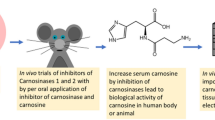Summary.
This review gives a brief overview on the importance of L-carnitine for cell function. A well established role of carnitine is the transport of fatty acids (FA) into the mitochondrial matrix. There exist analogous carnitine dependent transport systems for FA into microsomes and peroxisomes. Different membrane transporters control the intracellular homeostasis of carnitine in particular the organic cation transporter OCTN2. Beyond that carnitine is involved in the regulation of gene transcription, inhibits platelet aggregation, stimulates erythropoiesis, acts as a radical scavenger, improves the age-associated decline of learning and memory as well as age associated changes in oxidative metabolism, and inhibits apoptosis of blood cells. These newly described functions of carnitine demonstrate that a given metabolite can be involved in a great number of different processes and cell functions.
Similar content being viewed by others
Author information
Authors and Affiliations
Corresponding author
Rights and permissions
About this article
Cite this article
Lohninger, A., Pittner, G. & Pittner, F. L-Carnitine: New Aspects of a Known Compound – A Brief Survey. Monatsh. Chem. 136, 1255–1268 (2005). https://doi.org/10.1007/s00706-005-0339-2
Received:
Accepted:
Published:
Issue Date:
DOI: https://doi.org/10.1007/s00706-005-0339-2




